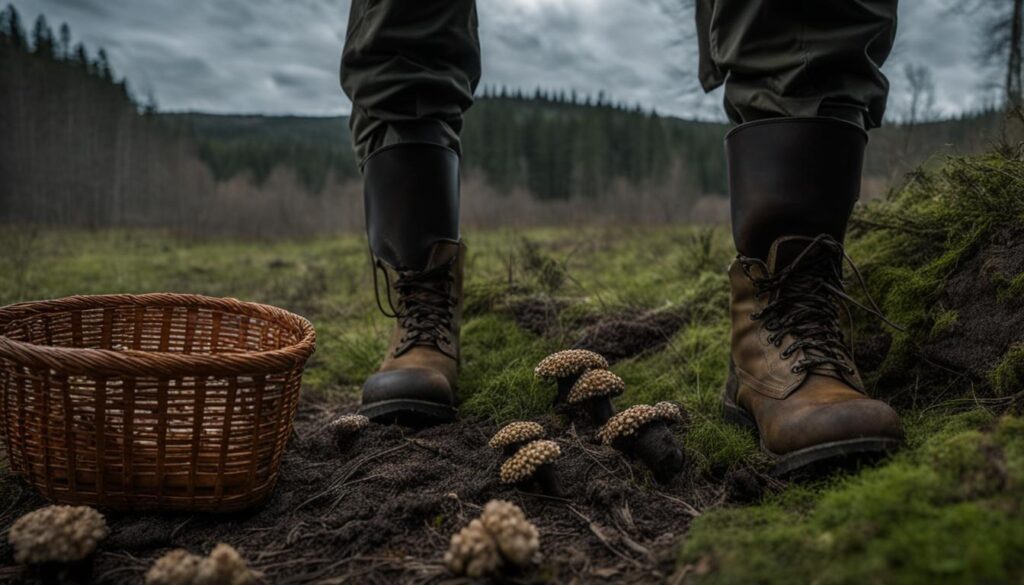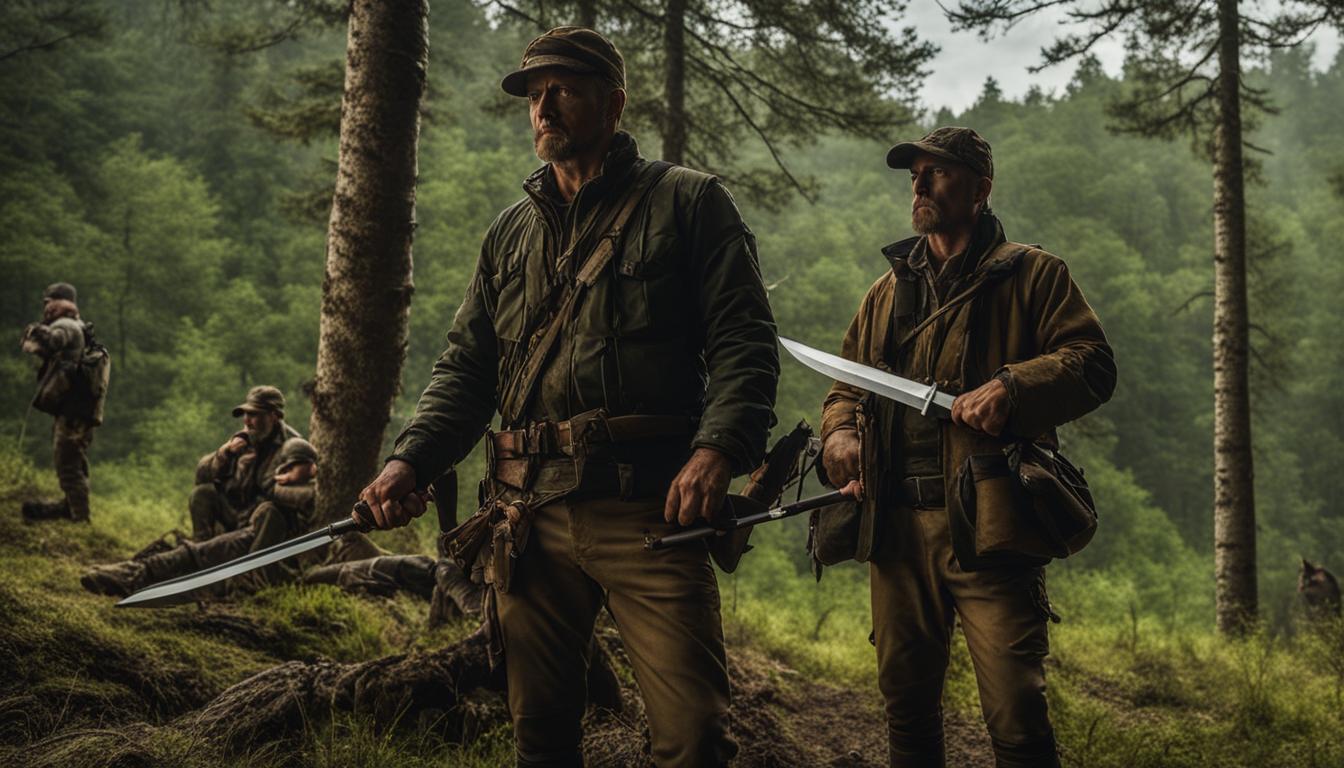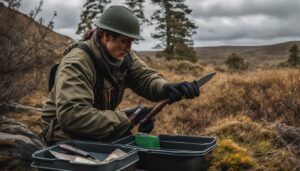As a responsible hunter, I understand the importance of adhering to hunting knife etiquette rules. The way we handle our hunting blades reflects our respect for the sport, the wildlife, and our fellow hunters. In this guide, I will shed light on the unspoken rules of etiquette that every responsible hunter should follow.
Key Takeaways:
- Responsible hunting requires adherence to hunting knife etiquette rules.
- Proper handling of hunting blades shows respect for the sport and fellow hunters.
- Etiquette ensures fair chase and ethical hunting practices.
- Understanding the unspoken rules promotes safety and camaraderie in the hunting community.
- Follow the guidelines to maintain a positive hunting experience for everyone involved.
The Four C’s: Careful, Courteous, Considerate, Capable
Hunting ethics are built on the foundation of the Four C’s: careful, courteous, considerate, and capable. These qualities embody responsible hunting behavior and are essential for maintaining a respectful and sustainable hunting community.
Careful hunting involves adhering to basic safety rules and regulations. It means being knowledgeable about proper firearm handling, wearing appropriate safety gear, and ensuring that hunting equipment is well-maintained. Careful hunters prioritize the safety of themselves, other hunters, and the general public.
Courtesy is an integral part of hunting etiquette. It means being polite and helpful to fellow hunters and non-hunters alike. Courteous hunters respect the rights and boundaries of others, offering assistance when needed, and demonstrating good sportsmanship in their interactions.
Consideration encompasses respect for fellow hunters and the non-hunting public, as well as the wildlife being pursued. Considerate hunters understand the importance of minimizing disruption to other hunters’ experiences and ensuring that non-hunters are not negatively impacted by hunting activities. Additionally, they demonstrate a deep appreciation for the ecosystems and habitats they explore.
Lastly, capable hunters possess the necessary skills, knowledge, and judgment to partake in hunting activities responsibly. They continuously strive to improve their abilities and stay informed about local hunting regulations and best practices. Capable hunters understand their limitations, making ethical decisions to ensure a humane and successful hunt.
Table: Comparison of the Four C’s
| Careful | Courteous | Considerate | Capable |
|---|---|---|---|
| Adhering to safety rules | Being polite and helpful | Respecting boundaries | Possessing necessary skills |
| Ensuring proper equipment maintenance | Showing good sportsmanship | Minimizing disruption to others | Staying informed about regulations |
| Prioritizing safety of all individuals | Respecting the rights of others | Appreciating ecosystems and habitats | Making ethical decisions |
Ethical Responsibilities to Consider
When it comes to hunting, ethical responsibilities extend to various aspects of the activity. As responsible hunters, we have obligations to ourselves, other hunters, non-hunters, landowners, and the wildlife resource. By upholding these responsibilities, we contribute to the preservation of hunting as a sustainable and respectful practice.
First and foremost, we have a responsibility to ourselves. This begins with taking a hunter education course to ensure we have the necessary knowledge and skills to hunt safely and ethically. We must also maintain self-control, follow the four C’s (careful, courteous, considerate, capable), and be prepared for emergencies. Additionally, getting in shape before a hunt not only enhances our experience but also ensures we can handle the physical demands of the activity.
Our responsibilities also extend to other hunters. We should always strive to be respectful and avoid being rude or hogging opportunities. Sharing work and game meat with fellow hunters fosters camaraderie and mutual support within the hunting community. Furthermore, it is crucial to refrain from consuming alcohol or drugs while hunting, as it impairs judgment and endangers ourselves and others.
As responsible hunters, we must also consider our impact on non-hunters. Displaying harvested game discreetly and acting courteously towards non-hunters helps maintain positive relationships and promotes understanding between different groups. Respecting the rights and properties of landowners is equally important. Seeking permission before hunting on private lands, taking care of the property and equipment, and being considerate in our actions show our appreciation for the privilege of hunting on others’ properties.
Last but not least, our ethical responsibilities extend to the wildlife resource itself. This involves learning about the species we hunt, understanding conservation efforts, and obeying hunting and game laws. Reporting any violations we witness ensures that those who disregard ethical hunting practices are held accountable. Additionally, striving for a swift, clean kill demonstrates respect for the animals we pursue and minimizes suffering.
By embracing our ethical responsibilities, we contribute to the preservation of hunting as a time-honored tradition and a sustainable activity for future generations to enjoy.
Hunting Ethics
Hunting ethics are a set of moral principles that guide hunters in their behavior while engaging in the activity. These ethics encompass various aspects such as respect for wildlife, adherence to laws and regulations, fair chase, and responsible gun use. Ethical hunters understand the importance of sustainable hunting practices and prioritize the welfare of both the environment and the game they pursue.
When it comes to hunting, there are several ethical dilemmas that hunters may encounter. One such dilemma is the decision to take a shot. Ethical hunters ask themselves three questions before pulling the trigger: Is it legal, is it safe, and is it ethical? By considering these factors, hunters ensure that they are making responsible and ethical choices in the field.
Another aspect of hunting ethics is the importance of conservation. Ethical hunters understand the significance of preserving wildlife populations and habitats for future generations. They actively participate in conservation efforts, such as reporting violations and adhering to hunting season dates and bag limits. By practicing ethical hunting, individuals contribute to the overall sustainability and preservation of our natural resources.
Examples of Ethical Dilemmas in Hunting
To further illustrate the complexities of hunting ethics, let’s explore a couple of examples. One scenario involves a turkey hunter who spots a turkey roosting in a tree. While it may be legal to take a shot, ethical hunters understand that shooting a turkey out of the roost tree can be considered an unfair advantage, as the bird is unable to defend itself. In this situation, an ethical hunter would choose not to take the shot and instead wait for the turkey to be on the ground, providing a fair chase opportunity.
Another example pertains to taking a shot that could potentially harm other animals. Ethical hunters prioritize safety and minimize the risk of injuring non-target species. They carefully consider their surroundings, ensuring that there are no obstructions or other animals in the line of fire before taking a shot. By doing so, they uphold the principles of ethical hunting and promote the overall well-being of wildlife populations.
| Ethical Hunting Principles | Ethical Violations |
|---|---|
| Respecting wildlife and adhering to fair chase | Using illegal hunting methods or equipment to gain an unfair advantage |
| Following hunting laws and regulations | Engaging in poaching or hunting without proper licenses or permits |
| Practicing responsible gun use | Engaging in unsafe firearm handling or shooting without proper identification of the target |
| Contributing to conservation efforts | Disregarding bag limits, hunting out of season, or damaging wildlife habitats |
As hunters, it is our responsibility to uphold the highest ethical standards. By following hunting ethics, we can ensure the sustainability of the sport and the preservation of our natural resources for generations to come.
Hunting Knife Etiquette Rules: West Texas Hilton Hunting Club
When it comes to hunting knife etiquette, the West Texas Hilton Hunting Club has established a set of rules to ensure the responsible use of hunting knives. These rules not only promote safety but also foster respect for fellow hunters and the environment. By following these guidelines, hunters can contribute to the preservation of ethical hunting practices.
Rules of the West Texas Hilton Hunting Club
- Respect Hunting Areas: Members of the club should not encroach on another member’s designated hunting area. This promotes a sense of camaraderie and ensures that each hunter has their fair share of opportunities.
- Promote Safety: Hunting or shooting while intoxicated is strictly prohibited within the club. This rule prioritizes the safety of all members and reduces the risk of accidents.
- Consider the Club’s Reputation: Members should strive to uphold the reputation of the West Texas Hilton Hunting Club. This includes respecting the property, following all club guidelines, and reporting any violations.
- Observe Shooting Boundaries: Shooting across public roads or into adjacent properties is strictly prohibited. This rule emphasizes the importance of responsible shooting practices and prevents any potential harm to others.
By adhering to these rules, members of the West Texas Hilton Hunting Club demonstrate their commitment to ethical hunting practices, creating a safe and enjoyable environment for all.
| Rule | Description |
|---|---|
| Respect Hunting Areas | Members should not encroach on another member’s designated hunting area. |
| Promote Safety | Hunting or shooting while intoxicated is strictly prohibited within the club. |
| Consider the Club’s Reputation | Members should strive to uphold the reputation of the West Texas Hilton Hunting Club. |
| Observe Shooting Boundaries | Shooting across public roads or into adjacent properties is strictly prohibited. |
Responsible hunting practices, such as those enforced by the West Texas Hilton Hunting Club, are crucial for maintaining the integrity of the hunting community. By following these etiquette rules, hunters can display respect for fellow hunters, the environment, and the sport itself.
Morel Mushroom Hunting Precautions

When venturing out to hunt for morel mushrooms, it is important to take certain precautions to ensure a safe and enjoyable experience. Here are some key guidelines to follow:
Respect Private Property and Obtain Permission
Before entering any property to forage for morel mushrooms, always seek permission from the landowner. Respecting private property is not only a legal requirement but also ensures a good relationship with the landowner and helps preserve the activity for future mushroom hunters.
Practice Proper Mushroom Hunting Etiquette
When engaging in morel mushroom hunting, it is essential to adhere to proper etiquette. This includes refraining from asking others about their secret mushroom spots, as these locations are often cherished and kept confidential by experienced foragers. Respect the privacy and knowledge of fellow mushroom enthusiasts to maintain a positive and supportive community.
Equip Yourself with Knowledge
Before setting out on a morel mushroom hunt, equip yourself with knowledge about these mushrooms and their look-alikes. Identifying morels accurately is crucial for both safety and sustainability. Familiarize yourself with their distinctive features, such as their cone-shaped caps and hollow stems.
Additionally, be aware of other potential hazards during your mushroom hunting expedition. Keep an eye out for dangerous wildlife, such as snakes or spiders, and be cautious of other hunters who may be in the same area.
Lastly, be mindful of the environment by practicing Leave No Trace principles. Avoid littering and take care not to damage any natural surroundings while foraging for morel mushrooms. Leaving some mushrooms behind ensures their continued growth and availability for future seasons.
Be Equipped for Morel Mushroom Hunting
When venturing into the great outdoors for a morel mushroom hunt, it’s crucial to be properly equipped to ensure both a successful and safe experience. Here are some essential items to consider bringing along:
- Comfortable and Waterproof Hiking Shoes: Opt for sturdy footwear that provides ample support and protection against wet conditions.
- Bright Clothing: Wear brightly colored clothing to enhance visibility and promote safety, especially when hunting in areas where there may be other hunters present.
- Rain Gear: Pack lightweight and waterproof rain gear to stay dry in case of unexpected rain showers.
- Walking Stick: A walking stick can help with balance and stability, especially when traversing uneven terrain.
- Bug Spray: Keep pesky insects at bay by applying a reliable bug spray or wearing protective clothing.
- Charged Cell Phone: Ensure your cell phone is fully charged before setting out, allowing you to stay connected and call for help in case of emergencies.
Additionally, you may want to bring a few other items to enhance your morel mushroom hunting experience:
- Mushroom Pocket Guide Book: Carry a guide book that provides information on different mushroom species, including morels, to help with identification.
- Map and Compass or GPS: Having a reliable navigation tool is essential for staying on track and finding your way back to your starting point.
- Flashlight: A flashlight can come in handy if you find yourself still out in the woods after dark.
- Drinking Water and Food: Stay hydrated and energized by packing enough water and snacks for the duration of your mushroom hunting expedition.
- Matches: Carry waterproof matches or a lighter as an essential tool for starting a fire if necessary.
- Mesh Mushroom Bag: Use a mesh bag to collect your harvested morels, allowing spores to disperse and promote future mushroom growth.
While preparing for your morel mushroom hunt, it’s important to keep in mind the potential presence of ticks. Take precautions to prevent tick bites by wearing long sleeves, long pants tucked into socks, and using tick repellents as recommended by healthcare professionals.


Remember, being properly equipped for morel mushroom hunting not only increases your chances of success but also ensures that you have a safe and enjoyable experience in the great outdoors.
Conclusion
In conclusion, responsible hunting practices and morel mushroom hunting etiquette are vital for maintaining ethical behavior and sustainable enjoyment of these activities. By adhering to hunting knife etiquette rules and following the Four C’s of being careful, courteous, considerate, and capable, hunters can ensure fair chase and respectful engagement with the wildlife resource.
Similarly, when foraging for morel mushrooms, it is important to take precautions such as obtaining permission to hunt on private property, practicing proper mushroom hunting etiquette, and being knowledgeable about identifying safe mushrooms. By doing so, we can protect the environment, show respect for other hunters, and ensure the future availability of these delicacies.
I encourage all hunters and mushroom foragers to prioritize responsible practices in their pursuits. Whether it’s following the code of ethics for hunting or being equipped with the necessary gear and knowledge for mushroom hunting, we can all contribute to a positive and sustainable outdoor experience. Let’s continue to enjoy these activities while respecting the environment, wildlife, and fellow enthusiasts.
FAQ
What are the ethical responsibilities of a hunter?
Ethical responsibilities of a hunter include taking a hunter education course, following the 4 C’s (careful, courteous, considerate, capable), knowing what to do in an emergency, and practicing good hunting ethics.
What do the Four C’s represent?
The Four C’s represent the qualities of a responsible hunter. Careful means following basic safety rules, courteous means being polite and helpful, considerate means showing respect for other hunters and the non-hunting public, and capable means having the necessary skills, knowledge, and judgment.
Who do hunters have ethical responsibilities to?
Hunters have ethical responsibilities to themselves, other hunters, non-hunters, landowners, and the wildlife resource.
What is hunting ethics?
Hunting ethics are a personal code of conduct that dictates how hunters should act. It is about doing the right thing even when no one else is watching.
What are the rules for hunting knives at the West Texas Hilton Hunting Club?
The rules for hunting knives at the West Texas Hilton Hunting Club include not encroaching on another member’s hunting area, not causing harm to the club, not hunting or shooting while intoxicated, and not shooting across public roads or into adjacent properties.
What precautions should be taken when hunting for morel mushrooms?
Precautions when hunting for morel mushrooms include respecting private property and obtaining permission to forage, practicing proper mushroom hunting etiquette, equipping oneself with knowledge about morel mushrooms and their look-alikes, being aware of dangerous wildlife and other hunters, and being mindful of the environment.
What equipment should I bring for morel mushroom hunting?
For morel mushroom hunting, it is important to be properly equipped with comfortable and waterproof hiking shoes, bright clothing for visibility, essential items such as rain gear, walking stick, bug spray, and a charged cell phone. Other items to consider bringing are a mushroom pocket guide book, a map and compass or GPS, flashlight, drinking water, food, matches, and a mesh mushroom bag.





